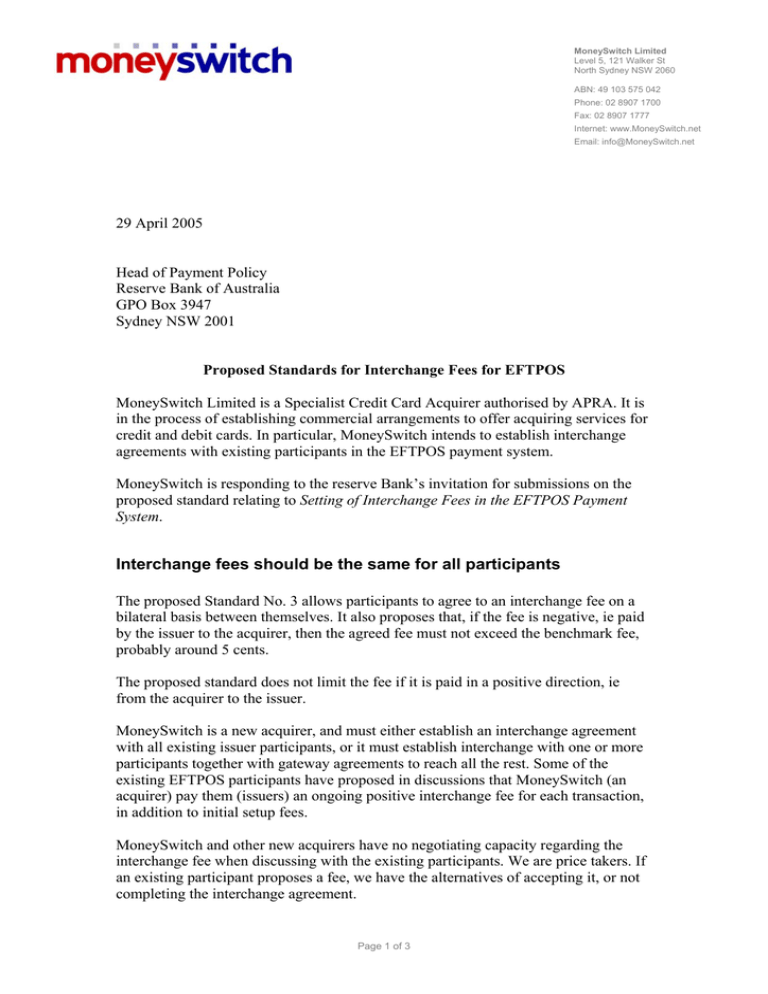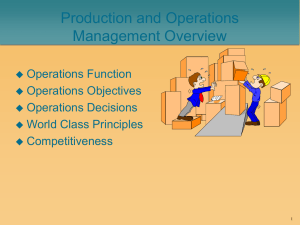Document 10818439
advertisement

MoneySwitch Limited Level 5, 121 Walker St North Sydney NSW 2060 ABN: 49 103 575 042 Phone: 02 8907 1700 Fax: 02 8907 1777 Internet: www.MoneySwitch.net Email: info@MoneySwitch.net 29 April 2005 Head of Payment Policy Reserve Bank of Australia GPO Box 3947 Sydney NSW 2001 Proposed Standards for Interchange Fees for EFTPOS MoneySwitch Limited is a Specialist Credit Card Acquirer authorised by APRA. It is in the process of establishing commercial arrangements to offer acquiring services for credit and debit cards. In particular, MoneySwitch intends to establish interchange agreements with existing participants in the EFTPOS payment system. MoneySwitch is responding to the reserve Bank’s invitation for submissions on the proposed standard relating to Setting of Interchange Fees in the EFTPOS Payment System. Interchange fees should be the same for all participants The proposed Standard No. 3 allows participants to agree to an interchange fee on a bilateral basis between themselves. It also proposes that, if the fee is negative, ie paid by the issuer to the acquirer, then the agreed fee must not exceed the benchmark fee, probably around 5 cents. The proposed standard does not limit the fee if it is paid in a positive direction, ie from the acquirer to the issuer. MoneySwitch is a new acquirer, and must either establish an interchange agreement with all existing issuer participants, or it must establish interchange with one or more participants together with gateway agreements to reach all the rest. Some of the existing EFTPOS participants have proposed in discussions that MoneySwitch (an acquirer) pay them (issuers) an ongoing positive interchange fee for each transaction, in addition to initial setup fees. MoneySwitch and other new acquirers have no negotiating capacity regarding the interchange fee when discussing with the existing participants. We are price takers. If an existing participant proposes a fee, we have the alternatives of accepting it, or not completing the interchange agreement. Page 1 of 3 There is a particular problem with negative interchange fees. It is psychologically difficult for an existing issuer to contemplate paying a negative interchange fee to a new acquirer seeking access. In the absence of a price fixed by regulation, the existing issuers are inclined to feel that they should be paid a positive fee by the new acquirer. If the existing participants enjoy a negative interchange fee between themselves at or about the proposed amount, and if a new entrant can only obtain an interchange fee that is either a positive fee or a smaller negative fee, then that new entrant is at a considerable competitive disadvantage compared with the existing participants. MoneySwitch believes that it is essential for a competitive market that the proposed Standard No. 3 sets a benchmark fee that is observed by all participants. In this way, provided there is also a suitable access regime, all participants, both incumbent and new, are able to compete on an even footing. Benefit of zero interchange fee The proposed Standard No. 3 sets a negative interchange benchmark fee based on the eligible processing and switching costs of a basket of acquirers. This is expected by the Reserve Bank to be around 5 cents, paid from the issuer to the acquirer. As argued in the section above, MoneySwitch believes that it is essential that there is a universal fixed EFTPOS interchange fee. We believe that a competitive environment for EFTPOS acquiring will be achieved regardless of the amount of the fee, just as long as it is the same for all participants. However, we believe that there are significant benefits if the interchange fee is set to zero. Both issuers and acquirers have switching and processing costs. The standard as it is currently proposed has the issuer paying both its own costs and those of the acquirer. This is a significant disincentive for card issuers. We believe that recent improvements in technology and communications have significantly lowered these costs for those participants who take advantage of them. These improvements lower the overall processing cost, allowing much lower valued transactions to be processed economically. The lower cost will open the door to new micro payment and stored value card payments. If the interchange fee is set at zero, this will encourage significant innovation in the small payment issuer area. These new issuer products will be able to use existing (and new) acquirer facilities and will be able to be widely used. If there is a negative interchange fee, this will provide a significant disincentive to innovation in the low value transaction market. Page 2 of 3 MoneySwitch’s other positions on the benefit of zero interchange are: It is likely to increase the usage of EFTPOS cards by cardholders as the costs to them become lower Both acquirers and issuers have essentially similar processing and switching costs. Why should one party subsidise the other, especially when the subsidy runs in different directions for EFTPOS when compared to credit cards? The Direct Entry system for credits and debits appears to function satisfactorily with zero interchange fees. Why is EFTPOS any different? Sincerely, Paul A Wood Chief Technology Officer Page 3 of 3

